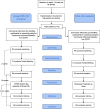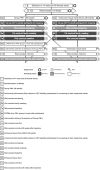Effectiveness of Group Problem Management Plus (Group-PM+) for adults affected by humanitarian crises in Nepal: study protocol for a cluster randomized controlled trial
- PMID: 32307009
- PMCID: PMC7168994
- DOI: 10.1186/s13063-020-04263-9
Effectiveness of Group Problem Management Plus (Group-PM+) for adults affected by humanitarian crises in Nepal: study protocol for a cluster randomized controlled trial
Abstract
Background: Globally, the lack of availability of psychological services for people exposed to adversities has led to the development of a range of scalable psychological interventions with features that enable better scale-up. Problem Management Plus (PM+) is a brief intervention of five sessions that can be delivered by non-specialists. It is designed for people in communities in low- and middle-income countries (LMIC) affected by any kind of adversity. Two recent randomized controlled trials in Pakistan and Kenya demonstrated the effectiveness of individually delivered PM+. A group version of PM+ has been developed to make the intervention more scalable and acceptable. This paper describes the protocol for a cluster randomized controlled trial (c-RCT) on locally adapted Group PM+ in Nepal.
Methods/design: This c-RCT will compare Group PM+ to enhanced usual care (EUC) in participants with high levels of psychological distress recruited from the community. The study is designed as a two-arm, single-blind c-RCT that will be conducted in a community-based setting in Morang, a flood affected district in Eastern Nepal. Randomization will occur at ward level, the smallest administrative level in Nepal, with 72 enrolled wards allocated to Group PM+ or to EUC (ratio 1:1). Group PM+ consists of five approximately 2.5-h sessions, in which participants are taught techniques to manage their stressors and problems, and is delivered by trained and supervised community psychosocial workers (CPSWs). EUC consists of a family meeting with (a) basic information on adversity and mental health, (b) benefits of getting support, (c) information on seeking services from local health facilities with mhGAP-trained staff. The primary outcome measure is levels of individual psychological distress at endline (equivalent to 20 ± 1 weeks after baseline), measured by the General Health Questionnaire (GHQ-12). Secondary outcome measures include levels of functioning, depressive symptoms, post-traumatic stress disorder symptoms, levels of social support, somatic symptoms, and ways of coping. We hypothesize that skills acquired will mediate any impact of the intervention.
Discussion: This c-RCT will contribute to the growing evidence-base for transdiagnostic psychological interventions delivered by non-specialists for people in communities affected by adversity. If Group PM+ is proven effective, the intervention manual will be released for use, giving the opportunity for further adaptation and implementation of the intervention in diverse settings with communities that require better access to psychological interventions.
Trial registration: ClinicalTrials.gov, NCT03747055.
Keywords: Cluster randomized controlled trial; Group interventions; Humanitarian emergencies; Low- and middle-income countries; Mental health; Nepal; Non-specialists.
Conflict of interest statement
The authors declare that they have no competing interests.
Figures
References
-
- WHO . Problem Management Plus (PM+): Individual psychological help for adults impaired by distress in communities exposed to adversity. Geneva: WHO; 2010.
-
- OCHA . Nepal earthquake 2015 situation report No. 20. 2015.
Publication types
MeSH terms
Associated data
Grants and funding
LinkOut - more resources
Full Text Sources
Medical



